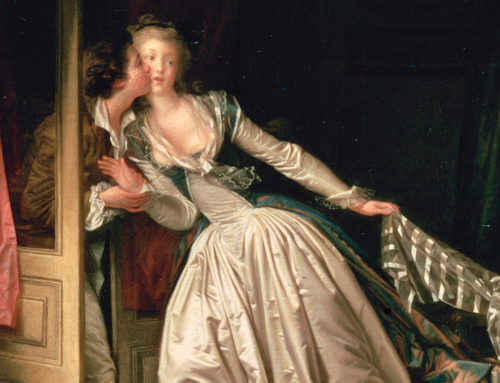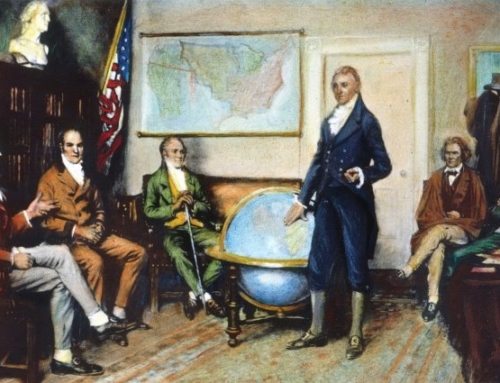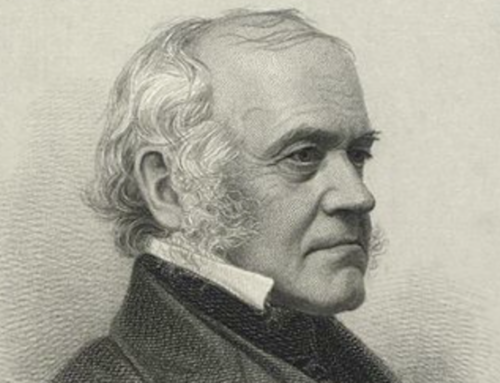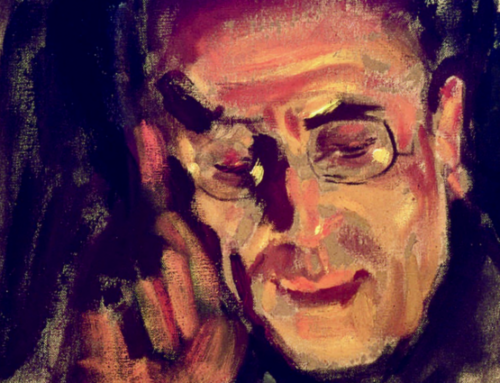 Music is a constant part of our lives, yet its nature remains elusive. We tend to take music for granted, like any product or commodity, not realizing what a strange phenomenon and unusual gift it is. Aristotle acknowledged as much: “It is not easy to determine the nature of music or why anyone should have a knowledge of it.”* Music is the most mysterious of the arts, the hardest to pin down. We cannot define what music “means” in so many words; yet it undoubtedly speaks to us. We cannot see it (although we can see the act of producing it and understand the physical laws that lie behind it); yet it has an undeniable presence that fills and enlarges our souls.
Music is a constant part of our lives, yet its nature remains elusive. We tend to take music for granted, like any product or commodity, not realizing what a strange phenomenon and unusual gift it is. Aristotle acknowledged as much: “It is not easy to determine the nature of music or why anyone should have a knowledge of it.”* Music is the most mysterious of the arts, the hardest to pin down. We cannot define what music “means” in so many words; yet it undoubtedly speaks to us. We cannot see it (although we can see the act of producing it and understand the physical laws that lie behind it); yet it has an undeniable presence that fills and enlarges our souls.
People have attempted to define music in various ways: more objectively as organized sound, more subjectively as the expression of human passions and emotions through sound. For comprehensiveness, it’s hard to beat the Webster’s definition: “an art of sound in time that expresses ideas and emotions in significant forms through the elements of rhythms, melody, harmony, and dynamics.”
One is startled to learn from the Webster’s entry that the word “music” (which has roots going back to the Greek mousike, art of the muses) didn’t enter the English language until about 1200. One assumes that in previous times English speakers simply referred to different types of musical performance but lacked a term for the general act of music. That concept—music as an organized art form and body of knowledge—would appear then to be an achievement of the high Middle Ages, building on the theories of the ancient Greeks. The very look of the word “music” is telling, with the suffix –ic which often, as in this case, denotes “an art or system of thought.” Thus we have logic, the art of reasoning; dialectic, the art of logical argumentation; music, the art of the muses.
The muses, of course, were a collection of female deities in Greek mythology, somewhat vaguely defined, who were attached to various human arts and disciplines. We must understand that music was not a completely autonomous thing for the Greeks; it was variously associated as an adjunct to poetry or as a phase or expression of mathematics or philosophy. From Pythagoras (5th century B.C.) came the notion of music as a reflection of the order that underlies the cosmos. He discovered that musical intervals inhere in precise numerical ratios, from which later thinkers would deduce the existence of a reasoning intelligence—i.e., God. Music thus held the key to understanding logos, the entire rational structure of the universe. Pythagoreans believed that the cosmos literally emitted musical tones, which our human music could but dimly reproduce. Music was thus akin to the natural law, something preexisting in nature which we could discover.
As rearticulated by the Roman Christian philosopher Boethius, the idea passed into medieval and modern thought. From him and his treatise De Musica come the familiar threefold division musica mundana, musica humana, and musica instrumentalis. The music we human beings produce with instruments or our voices (musical instrumentalis) is merely a reflection of the larger order of the cosmos, the eternally vibrating “music of the spheres” (musica mundana). Intermediate between these two is the harmonious workings of the human body itself (musica humana). Thus, the harmony of the body is a microcosm of the harmony of the universe. This classical view is pithily expressed in a quote by Lao Tzu: “Music in the soul can be heard in the universe.” “Music” in this larger and transcendent sense thus means the harmony that underlines all things. It contains an assurance that we live in a universe ruled by order, not chaos.
On the other side to this transcendent, rational conception of music have been those who emphasize music’s effect on the passions, sentiments or emotions. On one level, this is not opposed to the Pythagorean view but indeed an extension of it; the harmony of the cosmos is reflected on the smaller level of the harmony of the human soul. Plato devotes a good amount of thought on music and its role in the ideal society, prescribing or discouraging various modes or scales on the basis of what emotional states they encourage. Thus we have the recurring theme in civilization of the ethical role of music in forming character of individuals and societies.
The conception of music as rational order and the conception of music as emotional expression have contrasted throughout the history of Western music. In one guise, it appears as the aesthetic dichotomy between the classical and the Romantic (or, to use Nietzsche’s terms, the Apollonian and the Dionysian). It’s arguable that in the music of the greatest composers, such as Bach and Mozart and Beethoven, mind and heart are in perfect balance. Yet, on closer examination, one can identify subtle proportions of each; on balance a composer may be more intellectual or more emotional. It’s not the question here whether music expresses the emotions of the individual musical creator (an arch-Romantic view) or universal human affects and emotions (the view of the ancients and most eras before Romanticism); for our purposes here both views amount to the same thing, which is that music exercises an emotional power.
Music exercises this emotional power through its intrinsic elements: rhythm, melody, harmony, texture or counterpoint. Sentiments ranging from joy, serenity, and elation to fear and vehemence can be suggested through melodic shape, harmonic content, and rhythmic activity. But this happens in ways that are non-specific and vague enough to admit of any number of personal interpretations. Music is not—even when joined to a text or a storyline, as in program music—a literary art; it does not mean anything that you can pin down in words. It is a largely subjective art, offering a range of possible interpretations as to meaning. Within reasonable parameters, a musical composition may suggest different emotional meanings to you or to me, and that is all to its benefit. Musical ideas, figures and gestures (melodies, harmonies, etc.) remain at bottom simply music, but they are capable of pointing beyond themselves—never, though, in a way that suggests an exact or fixed meaning.
To this emotional dimension of music must be added the rational dimension, related to formal structure and to music’s expression of order and logos. The concept of musical work is important here. Music is an artform in time. Aside from improvisation or “noodling” (unstructured practicing) we don’t experience music as a vague formless substance, but as discrete pieces or works. In other words, music has form, and the idea that music expresses order and structure is essential. Structure in a musical piece (one can even talk of music’s “architecture”) has to do with recurrence and repetition, with implied sections or divisions, with how various musical “events” succeed each other in time—in short, with how a composer shapes his musical ideas into a meaningful experience. That music exists in time means that it is clear-cut and delimited, existing within the “frame” of a musical composition.
Even apart from this delimiting factor, it’s obvious that music is evanescent like no other artform; it lasts for as long as the sound waves vibrate in the air, then it is over. Yet it resounds in our minds and souls, leaving a strong impression on us. And of course, any musical composition may be performed again and revisited, thus extending the power of the music.
Worthy of note are the rational implications of the term “composition” and “composer.” Despite the fact that the other arts also involve putting things together into a whole, only in music is the creator referred to as a “composer.” This is a curious development of language, but significant nonetheless. The composer puts together notes into a meaningful whole. He takes sounds, as envisioned in his mind’s ear, and represents them on paper in a score, which is a sort of blueprint for their actualization in sound. Thus, no matter how strongly emotional may be the impulse behind it, the creation of music is a very rational activity.
Both of the traditional conceptions of music are undoubtedly true and valid: It is transcendent and stable, expressing the eternal truth of the cosmos; it is also intimate, emotional, and volatile, expressing the passions of man. It embodies harmony and order and is a “pleasing arrangement of sounds”; it also may express the turmoil in the human soul and include dissonance and conflict. Let me propose another conception, namely that apart from any specific emotion music expresses the principle of life itself. Just about any music expresses movement, vitality and energy, especially through its most basic and primal element of rhythm. This is also true of music that is relatively calm and static, since even this sort of music is never completely devoid of motion. (Only a single tone held out at length would be completely motionless, but such monotony would hardly be music, which must be an arrangement of sounds.) Melody too is a mobile element, embodying line and emotional development, while harmony expresses the dynamic of tension and repose that is so much a part of the “journey” that Western musical compositions take us on.
Music thus expresses growth and life, and hence, I would argue, hope and faith. The opposite of inertia and despair—their negation, in fact—music aspires to a higher order of which we are a part. Even when we express sorrow and tragedy in music, the expression itself acts as a catharsis, helping us rise above the sorrow by transforming it into beautiful sonic form.
The concepts of music as embodying being and life, as embodying emotion, and as embodying reason and order can all be seen as phases of the same idea. For all those things are part of the divine order of the cosmos, an order in which we participate by making music. From whichever angle you choose to look at it, music is one of the most spiritual gifts we have been given in our natural life—an art possessing a special privilege among the arts, as even creators in other artistic fields have conceded. The most immaterial and elusive of all the arts, it also penetrates the deepest and affects us the most.
*Aristotle, Politics, Book 8, Part 5
The Imaginative Conservative applies the principle of appreciation to the discussion of culture and politics—we approach dialogue with magnanimity rather than with mere civility. Will you help us remain a refreshing oasis in the increasingly contentious arena of modern discourse? Please consider donating now.
The featured image is courtesy of Pixabay.







Excellent Article!
I have spent the last 5 years researching & writing on this very topic, (Showing the necessity of Music/Sacred Music through the lens of Faith and Reason as well as an thorough overview of Aquinas’ Virtue of Religion and how Sacred Music fits into this Virtue as proper works of worship.)
Anyway, your article is a very close rendition to my own findings which is pleasing to see.
Thanks again!
“we can see the act of producing it and understand the physical laws that lie behind it”
This reminds me of an encounter between the composer, Ottornio Respighi, and the physicist, Enrico Fermi, while they were both passengers on a transatlantic cruise.
Fermi asked Respighi if he could explain music in terms of physics. Respighi replied that he had no idea how to do that.
This article characterizes how music expresses emotional content nicely. What is not mentioned is the capacity of music to create a sense of the time and place in which that musical expression was created, which is the other central character of musical expression. Music is composed in a specific period of time and in a particular place by those who inhabited that time and place. By its inherent nature then, that musical genre is an expression of the consciousness of that time; it characterizes and expresses the cultural elements of that time and in that place. The reason new Baroque music (for instance) is no longer being written is not merely because that genre has been exhaustively explored, but because the consciousness of both the creators of music and the hearers of music have evolved in their consciousness, including their consciousness of musical expression. Like other forms of cultural expression, each genre of music then becomes a preparation for what develops after it.
Music has been given to us for those times when words simply will not do.